
Don’t start with the premise that childbirth is broken, Janhavi Nilekani Premium
The Hindu
“Ensuring a mother and child survive childbirth is the basic minimum. It should not be the ceiling of what you achieve,” says Janhavi Nilekani, the founder and Chairperson of the Aastrika Foundation, a nonprofit dedicated to transforming maternal healthcare. But the transformation of maternal healthcare in India is far from easy. “Poor quality of maternal healthcare is so normalised in India,” she says.
“Ensuring a mother and child survive childbirth is the basic minimum. It should not be the ceiling of what you achieve,” says Janhavi Nilekani, the founder and Chairperson of the Aastrika Foundation, a nonprofit dedicated to transforming maternal healthcare. But the transformation of maternal healthcare in India is far from easy. “Poor quality of maternal healthcare is so normalised in India,” she says.
The issue is harder to address, she adds, because it lies at the intersection of poor-quality healthcare and the lack of agency for many women in our country. Changing the narrative around childbirth is what the Aastrika Foundation, which turned five on May 9, has sought to do right from its inception, steadfast in “the belief that all childbearing women must have access to high quality, timely, respectful maternity care and fundamental rights, including privacy, the companionship of a loved one, informed consent, and an abuse-free birthing experience,” as the Aastrika website states.
One of the key objectives of the foundation, supported by Nilekani Philanthropies, is to establish midwifery as a profession with a trained cadre. “Midwives bring a lot to the table for every section of society and that is why it was important to us,” says Nilekani, a development economist by training. “It is a solution not just for underserved people but also for places with massive amounts of over-intervention.”
The Aastrika Foundation currently has several programmes under its umbrella: Aastrika Sphere, their capacity-building programme, their Nurse Practitioners in Midwifery (NPM) programme, part of the Government of India’s 2018 midwifery initiative and a robust advocacy and community-building programme. “I think I started with a very clear mission, and we have done a fantastic job—tried to be focused and allowed for organic growth,” believes Nilekani.
Edited extracts of an interview











